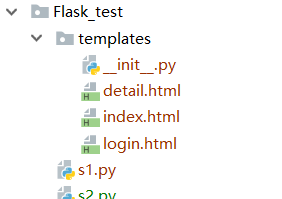1 #!/usr/bin/env python
2 # -*- coding: utf-8 -*-
3 # @Time : 2019/11/2 20:53
4 # @Author : zoulixiang
5 # @Site :
6 # @File : s2.py
7 # @Software: PyCharm
8
9 from flask import Flask,render_template,request,redirect,session,url_for
10
11 app = Flask(__name__)
12 #自动重启和检测,调试模式
13 app.debug = True
14
15 USERS = {
16 1:{'name':'z','age':12,'gender':'男','text':'ssssssss'},
17 2:{'name':'z1','age':13,'gender':'男','text':'xxxxxxxx'},
18 3:{'name':'z1','age':14,'gender':'女','text':'hhhhhhhh'}
19 }
20
21 @app.route('/detail/<int:nid>',methods=['GET'])
22 def detail(nid):
23 # 当你登录成功之后,session是有值,有值之后上面每个登录都需要重新判断
24 user = session.get('user_info')
25 if not user:
26 return redirect('/login')
27 info = USERS.get(nid)
28 return render_template('detail.html',info=info)
29
30
31 @app.route('/index',methods=['GET'])
32 def index():
33 #session #当你登录成功之后,session是有值,有值之后上面每个登录都需要重新判断
34 user = session.get('user_info')
35 if not user:
36 #反向生成url
37 url = url_for('l1')
38 return redirect(url)
39 return render_template('index.html',user_dict=USERS)
40
41
42 @app.route('/login',methods=['GET','POST'],endpoint='l1') #endpoin 别名
43 def login():
44 if request.method == "GET":
45 return render_template('login.html')
46 else:
47 user = request.form.get('user')
48 pwd = request.form.get('pwd')
49 if user == 'alex' and pwd == '123':
50 #当你登录成功之后,session是有值,有值之后上面每个登录都需要重新判断
51 session['user_info'] = user
52 print(session['user_info'])
53 return redirect('https://www.baidu.com')
54 return render_template('login.html',error = '用户名或密码错误')
55
56 if __name__ == '__main__':
57 app.run()

2.tmplates目录
login.html
<!DOCTYPE html>
<html lang="en">
<head>
<meta charset="UTF-8">
<title>Title</title>
</head>
<body>
<h1>用户登录</h1>
<form method="post">
<input type="text" name="user">
<input type="text" name="pwd">
<input type="submit" name="登录">{{error}}
</form>
</body>
</html>
<!DOCTYPE html>
<html lang="en">
<head>
<meta charset="UTF-8">
<title>Title</title>
</head>
<body>
<h1>用户列表</h1>
<table>
{% for k,v in user_dict.items() %}
<tr>
<td>{{k}}</td>
<td>{{v.name}} {{v['name']}} {{v.get('name')}} </td>
<td><a href="/detail/{{k}}">查看详细</a></td>
</tr>
{% endfor %}
</table>
</body>
</html>
<!DOCTYPE html>
<html lang="en">
<head>
<meta charset="UTF-8">
<title>Title</title>
</head>
<body>
<h1>详细信息</h1>
<div>
{{ info.name }}
{{ info.text }}
</div>
</body>
</html>
